From Lewis S. Blevins, M.D. This image depicts what appears to be a right-sided pituitary adenoma. It is a well-defined and circumscribed darker lesion in the right half of the gland. It developed over a period of time of surveillance of the patient who had a history of neurosarcoidosis – read more about neurosarcoidosis – affecting the cerebellum, spinal fluid cisterns around the brain, and the pituitary infundibulum. The neurosarcoidosis had been successfully treated with steroids, azathioprine, and methotrexate. Although it was felt that the new lesion could represent recurrent neurosarcoidosis, since it had the appearance of pituitary adenoma, surgery was determined to be the best course of further evaluation prior to proceeding with additional treatment that is expensive and often dangerous using medications to treat neurosarcoidosis. The lesion was resected in its entirety. It was proved to be neurosarcoidosis. Lesions of the pituitary mimicking adenoma have been reported in neurosarcoidosis but are rare without involvement of the pituitary stalk and CSF cisterns. Sarcoidosis may affect the lungs, lymph nodes, and skeletal system and as well as the central nervous system. Isolated central nervous system sarcoidosis is referred to as neurosarcoidosis. Diagnosis can be difficult and often depends on biopsy confirmation. Diabetes insipidus and a degree of hypopituitarism are often present. Treatment involves management of diabetes insipidus and hypopituitarism as well as immunomodulatory therapy including the possibility of high-dose steroids, methotrexate, azathioprine, and monoclonal antibody therapies. We do not understand the exact cause of this mysterious illness that presents in a number of different ways.
Editors note: If you want to read more about neurosarcoidosis here’s a summary from the National Institutes of Health
Sarcoidosis is an inflammatory disease that can affect multiple areas of the body, including the lungs, eyes, skin and, in some cases, the heart. Doctors believe sarcoidosis results from the body’s immune system responding to an unknown substance, most likely something inhaled from the air. More info on Sarcoidosis here.
© 2017 – 2024, J D Faccinetti. All rights reserved.
